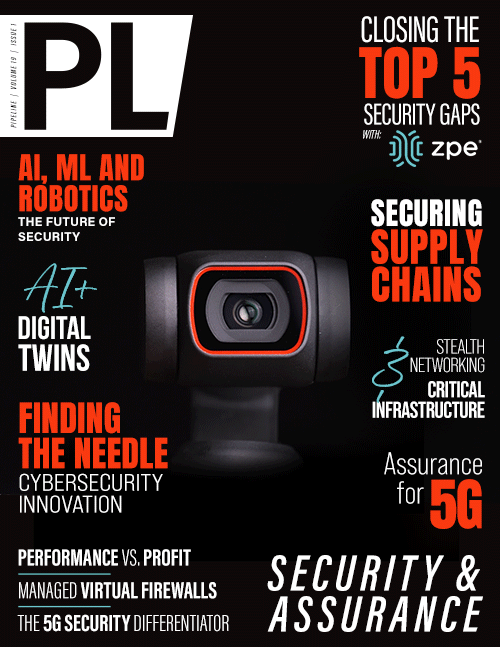By: Koroush Saraf - VP Product Management, ZPE Systems
Although cybersecurity is a $155 billion industry with more than 1,800 vendors, companies still struggle to assemble holistic cybersecurity. According to IBM’s 2022 Cost of a Data Breach
report, ransomware breaches increased 41 percent in the last year and now cost $4.54 million on average. With many great products available and increasing investment in cybersecurity, why aren’t
these attack trends decreasing? Why is it so difficult to protect digital assets? Working with Big Tech, ZPE Systems has developed a reference architecture—a network automation blueprint—as the
best practice to cover the security gaps that remain open…
» read this article
By: Wes Swenson
From distributed denial of service (DDoS) attacks on some of the world’s biggest names in business, including Amazon and Google, to ransomware, phishing, and domain name system (DNS) breaches
that count CNN and PayPal as victims, and cyberattacks of all sizes—the methods and sophistication of these threats continue to prove the importance of an ironclad data center security plan.
Physical threats, too, like overheating servers and unauthorized visitors, are top-of-mind considerations for data center security professionals…
» read this article
By: Luke Hinds
When asked to reflect on March 2020, most people will recall an unsettling global environment as governments and international organizations grappled with the uncertainty of the COVID-19
pandemic. Technology leaders, however, may have a different perspective. In the midst of country-wide lockdowns, digital transformation began accelerating more quickly than ever as masses of
workers were forced to establish working environments in their homes and rely on cloud-based platforms to collaborate with colleagues…
» read this article
By: Rajiv Pimplaskar
Several critical infrastructure sectors utilize industrial control system (ICS) and supervisory control and data acquisition (SCADA) systems and IoT devices, which can often present appealing
soft targets for threat actors. There is a significant percentage of such devices that can have inherent vulnerabilities and, unfortunately, many of these systems are operated outside the purview
of the security teams that manage the Common Vulnerabilities and Exposures (CVEs) and the Cybersecurity and Infrastructure Security Agency (CISA) advisories…
» read this article
By: Jacob Ukelson, D.Sc.
The gap between the ability of cyber attackers to breach IT networks and the effectiveness of cyber defenses is widening. The elements contributing to this include automation and
sophistication. Automation enables attackers to go after many more targets at very low cost to them. The increased sophistication of the attacks makes it more difficult to detect and defend against
them. The state of cyber defense today is that there is still a heavy reliance on manual processes. Security operations center (SOC) personnel need to respond to alerts and make decisions as to
which alerts to investigate…
» read this article
By: Mark Cummings, Ph.D., William Yeack,
CSE
How is it that after all these billions of dollars of investment, the bad guys can still get in? The good news is that today’s cybersecurity technology blocks 99 percent of attacks.The bad news
is that there is such a massive volume of attacks that the remaining one percent that gets through can create a financial and operating nightmare. For example, in the first half of 2022, there were
236 million ransomware attacks reported during which the bad guys got in. There were likely many more that have not become public…
» read this article
By: Charles Thompson
The telecom industry is buzzing with anticipation for the amazing new services that 5G Standalone (5G SA) networks will enable: mass-scale industrial automation, remote surgery, ubiquitous
augmented reality experiences, and much more. But before communication service providers (CSPs) start tallying up revenue projections for new 5G offerings, they’ll need to nail down a few small
details. Things like verifying that their networks are actually delivering the low latency and reliability that these services demand…
» read this article
By: Suresh Chintada
Profitability is the underlying driver of telecom operations, fueled primarily by margin calculations. Over the past three years, though, profit margins have been deteriorating by 13 percent on
average. The reasons are many: consumer habits are changing, forcing telcos to compete and offer complex bundled products. In cases where CSPs introduced products with negative margins, it has led
to a massive $3.4 billion in losses. In addition, agile OTT providers pose stiff competition by meeting customer demand for relevant OTT content such as videos, music, movies, and more—eating into
telcos’ market share…
» read this article
By: Carolyn Raab
With the number of cyberattacks growing and hackers becoming more sophisticated, the cost and complexity of network security is increasing. Enterprises are acutely aware of their need for
best-in-breed threat protection, but they don’t want the complication and expense of dealing with hardware appliances that lock them in and don’t scale. Instead, they want a firewall service that
is easier to manage while also offering the latest security solutions. Service providers (SPs) and managed security service providers (MSSPs) are uniquely positioned to solve these challenges by
offering managed virtual firewall services…
» read this article
By: Eduardo Holgado
As far as consumers are concerned today, 5G is about speed and to a lesser extent latency. But is that enough to attract subscribers to new 5G networks? Mobile operators are scrambling to roll
out 5G networks at great expense. For those consumers who have done their homework, excitement about new services is high. But just like any service, 5G operators will need to differentiate their
offering to compete with other 5G networks. When you ask consumers today what the greatest benefit of 5G is, they almost unanimously say that it is speed, with some adding latency to the mix and
the hope that 5G will be more reliable than 4G…
» read this article
By: Jara Kern, Pipeline
It’s been a spooky time of year, not only for ghouls and goblins but also for malware and data breaches. As we wrap the annual observance of Cybersecurity Awareness Month, we now deliver our
Security and Assurance issue, with headlines focused on the top trends and new releases to keep our digital assets and virtual lives secure. News this month also focused on 5G rollouts, progress
toward 6G, a next-gen network for research science, and much more. The top technology industry news stories from the month are summarized below…
» read this article
By: Scott St. John - Pipeline
It’s that time of year again. For those that celebrate Halloween, it’s chocked full of costumes, candy, and late-night scary movies. It’s an interesting holiday, where millions of people
try to turn fear into fun. It’s also become big business as candy, costume, and content companies all try to cash in. After all the tricks and treats the real world awaits, and it can be even
scarier. Hard as we may try not to, many have to worry about what will happen when they simply leave their houses, go to the movies or a concert, or even send their children to school…
» read this article


















